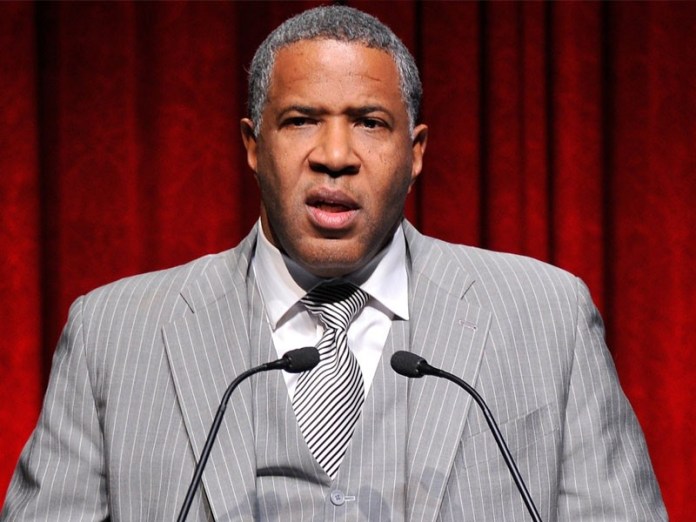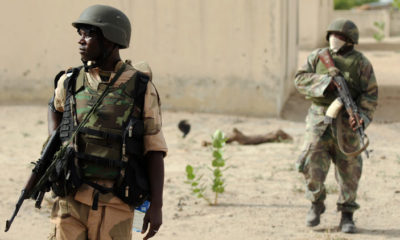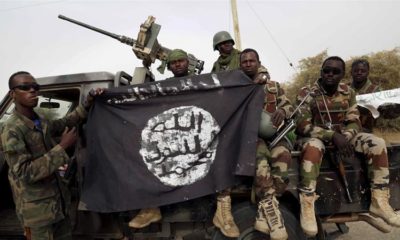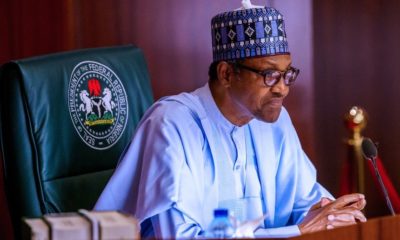- Black American Billionaire Offers to Pay for Chibok Girls’ Education
African American billionaire, Mr. Robert Smith, who is currently sponsoring 24 of the kidnapped Chibok schoolgirls that immediately escaped from captivity, at the American University of Nigeria (AUN), Yola, Adamawa State, has offered to also educate the 21 other girls who were freed last October by the Boko Haram terror sect.
Revealing this yesterday, President Muhammadu Buhari’s media aide, Mr. Garba Shehu, equally said that 21 Chibok girls were being treated as adoptees of the federal government, but disclosed that there was a lot of local and international interest in the future plans for the girls.
He said: “A black American billionaire, Mr. Robert Smith who is currently sponsoring the education of 24 girls from Chibok, among them the first set of escapees from Boko Haram, at the American University of Nigeria, Yola, has offered to pay for the education of the 21 girls released through negotiations and is offering to take responsibility for all the others who will hopefully be eventually set free.”
“The Murtala Mohammed Foundation in the country is equally interested,” he hinted.
Responding to complaints by the families of the 21 Chibok girls that officials of the Department of State Services (DSS) had not allowed the girls to visit them at their homes in Chibok on Christmas Day, Shehu admitted that there were some hitches arising from a lack of understanding of the objective of the trip on the part of some security operatives.
However, following the receipt of the complaint, he said a directive had been given from the headquarters of the DSS for the access by the parents to be eased.
“If the situation persists, please let us know so that the higher authorities will make a further intercession,” he said.
The families of the 21 Chibok girls freed by Islamist group Boko Haram had said yesterday that they the girls were being closely guarded and were not allowed home for Christmas.
Boko Haram kidnapped 276 girls in April 2014, but freed 21 of them in October after negotiations with the Red Cross.
The freed girls have been in the federal government’s custody since their release but were brought home to Chibok for Christmas.
But family members told the BBC that the girls were kept in a politician’s house and barred from going home.
They were also prevented from attending church services with their families.
The girls were taken to the house of an assembly member in Chibok to be reunited with their parents but were not allowed to go to their own homes.
“I can’t believe my daughter has come this close to home but can’t come home,” said one father.
“There’s no point bringing them to Chibok only to be locked in another prison. They couldn’t even go to church on Christmas Day.”
Since their release, the young women have been kept in a secret location in Abuja for government debriefing.
Another said a soldier had confiscated his phone when he tried to take a picture of his daughter.
He said: “I snapped a picture of myself and my daughter but the security guys came and grabbed me by shoulder and snatched the phone from my hands and told me to delete all the picture I took.
“I told him I’m taking a picture with my daughter who was away for more than two years. He said to me that’s not his business, he deleted all the pictures including other pictures that were not taken there.”
One mother said: “I can’t believe my eyes that now my daughter cannot come home. How can I be happy when they don’t have freedom?”
A statement from the office of state governor, Kashim Shettima acknowledged yesterday that “armed soldiers… escorted the 21 girls to Chibok and remained their strict guards throughout the Christmas”.
Speaking earlier this week, one of the girls told Reuters news agency it was a “miracle” that she was home and she was looking forward to church on Christmas Day.
“I never knew that I would return (home),” she said simply. “I had given up hope of ever going home.”
Of the 276 students kidnapped, 197 are still reportedly missing, and negotiations for their release are under way.
Many of the Chibok girls were Christian, but were ordered to convert to Islam and to marry their kidnappers during their time in captivity.
Ms. Goni said some were whipped for refusing to marry, but otherwise they were well treated and fed until food supplies recently ran short.
The Chibok girls were first reunited with their parents in Abuja.
Meanwhile, the Borno governor spent the whole of yesterday, Boxing Day, in Chibok town.
A statement by his media aide, Mr. Aliyu Gusau said that while in Chibok, Shettima met the 21 schoolgirls freed by the Boko Haram in October.
Gusau said after the governor took off by road from Maiduguri early yesterday, after which he hosted the girls at a government building in Chibok.
Shettima, he added, was accompanied by Senator Majority Leader, Mohammed Ali Ndume, who represents Borno South where Chibok is located.
“The girls were very excited meeting Shettima again after they had met him in Abuja days after their release from Boko Haram captivity.
“The girls were happy that they presented a gift of a medium sized photo frame with a bold ‘Thank you’ printed on it.
“The frame has the picture that the governor took with the girls when he visited them in Abuja some months back. It also has individual pictures of each of the 21 girls.
“Glory Dama, one of the 21 girls, presented the photo frame on behalf of her colleagues. She said they deeply appreciated the show of love by Governor Shettima and his wife, Nana.
“The governor’s wife has visited them countless times in Abuja and whenever she visits, she demands to know their needs and she met them all, Dama said during the presentation,” the statement added.
It noted that the governor informed the girls that with their cheerful mood, the next concern had to be their future.
“As you know, 56 of your colleagues who escaped abduction are currently in two international schools where they have been since 2014. We are taking care of all their educational needs, from school fees to other basics.
“Left to me, I would want the 21 of you to join them in those two schools so that you can all feel at home and move on. However, the federal government has a plan, which we will jointly discuss and come up with a decision that is acceptable to you our daughters.
“President Muhammadu Buhari loves you so much and he is deeply concerned about our daughters that are yet to be freed. He is working on that and we are all working,” Shettima was quoted as informing the girls.
Shettima also announced the appointment of Yakubu Nkeki, the chairman of an association of the Chibok schoolgirls’ parents as councillor of the Mbalala ward in Chibok Local Government Area.
“We appointed Yakubu Nkeki as councillor for him to have a formal platform to continue his advocacy for the welfare of families of the missing Chibok girls, for him to ensure that they are given special consideration at all times by the local government area on all issues, particularly on welfare, on issues of health, empowerment, etc.
“Nkeki will also serve as a constant reminder to the council that there are parents like him who live in pain. He is simply there to advocate for the welfare of the parents and also as someone who has been a victim, he will stand by the efforts of government to protect schools through community surveillance in addition to formal security establishments,” Shettima said.
The governor also consoled parents whose daughters were yet to be freed, promising that all hands were on deck to ensure the return of all the girls. “I will be meeting the parents tomorrow (today),” he said.
Shettima presented clothes to the girls and their parents. The governor had previously donated clothes to the girls in Abuja.
After his visit to Chibok, Shettima drove to Askira town where he passed the night and is scheduled to return to Chibok today for meetings with community leaders and separate meetings with parents whose schoolgirls were yet to be released and those of the 21 girls freed in October.
Askira where Shettima slept, was attacked by the insurgents in 2014 forcing residents including the emir to flee to Maiduguri.
The emir returned some months back after his palace was rebuilt by Shettima. Hundreds of residents returned with the emir.


 Billionaire Watch3 weeks ago
Billionaire Watch3 weeks ago
 Startups4 weeks ago
Startups4 weeks ago
 News4 weeks ago
News4 weeks ago
 News4 weeks ago
News4 weeks ago
 Bitcoin4 weeks ago
Bitcoin4 weeks ago
 Naira4 weeks ago
Naira4 weeks ago
 Forex3 weeks ago
Forex3 weeks ago
 Treasury Bills4 weeks ago
Treasury Bills4 weeks ago


























